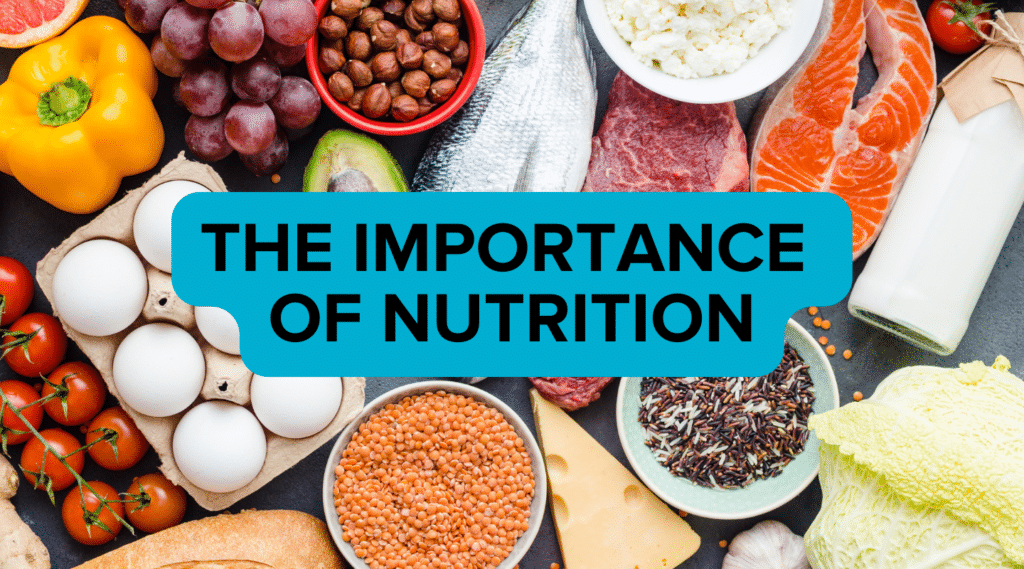Nutrition is the cornerstone of health and well-being, influencing everything from physical fitness to emotional stability. The food we consume provides our bodies with essential nutrients that are crucial for growth, development, and the maintenance of bodily functions. Understanding the importance of nutrition can empower individuals to make healthier choices that promote longevity and improve quality of life.
1. Nutrition as the Foundation of Health

At its core, nutrition is about fueling the body with the right ingredients to function optimally. Every cell, tissue, and organ in our body relies on a steady supply of nutrients to perform its tasks effectively. A balanced diet that includes a variety of foods from all food groups—fruits, vegetables, whole grains, lean proteins, and healthy fats—ensures that we receive a comprehensive range of vitamins, minerals, and antioxidants necessary for our body’s various functions.
2. The Role of Macronutrients and Micronutrients
Macronutrients—carbohydrates, proteins, and fats—are the primary components of our diet. Each serves a distinct purpose:
- Carbohydrates provide energy.
- Proteins support muscle repair and growth.
- Fats contribute to cell structure and hormone production.
Balancing these macronutrients according to individual needs is vital for maintaining energy levels and overall health.On the other hand, micronutrients, which include vitamins and minerals, play equally important roles in maintaining health. For instance:
- Calcium and Vitamin D are essential for bone health.
- Vitamin C and Zinc are crucial for immune function.
A diet rich in fruits and vegetables can help ensure an adequate intake of these micronutrients.
3. Hydration: An Often Overlooked Component
Water is essential for life and plays a critical role in overall health. Proper hydration supports digestion, nutrient absorption, temperature regulation, and detoxification processes. It is vital to drink enough water throughout the day and consider hydrating foods such as fruits and vegetables as part of your fluid intake.
4. The Connection Between Nutrition and Mental Health

Nutrition significantly impacts mental well-being. Certain nutrients have been linked to improved mood and cognitive function. For example, omega-3 fatty acids found in fish are known to support brain health, while deficiencies in vitamins like B12 can lead to fatigue and mood disorders. Practicing mindful eating—paying attention to what you eat—can foster a healthier relationship with food and improve emotional well-being.
5. Long-Term Health Benefits
The choices made at each meal accumulate over time, influencing long-term health outcomes. A consistently balanced diet is associated with a reduced risk of chronic diseases such as heart disease, diabetes, stroke, certain cancers, and osteoporosis. Investing in nutritional well-being today pays dividends in the form of a healthier future.
6. Practical Tips for Healthy Eating
To harness the benefits of good nutrition:
- Eat plenty of fruits and vegetables: Aim for a variety of colors to maximize nutrient intake.
- Choose whole grains: Opt for whole grain bread, pasta, and cereals over refined options.
- Incorporate lean proteins: Include sources such as fish, poultry, beans, and legumes.
- Limit processed foods: Reduce intake of sugary snacks and beverages high in added sugars.
Also Read : The Role Of Nutrition In A Wellness Lifestyle
Conclusion
Nutrition plays a pivotal role in shaping our overall health. By understanding its importance and making informed dietary choices, individuals can enhance their physical health, emotional well-being, and longevity. A balanced diet rich in essential nutrients not only fuels our bodies but also empowers us to lead vibrant lives filled with energy and vitality.
FAQs
1. What are macronutrients?
Macronutrients are the primary components of our diet: carbohydrates (energy), proteins (muscle repair), and fats (cell structure)
2. Why is hydration important?
Hydration supports digestion, nutrient absorption, temperature regulation, and detoxification processes.
3. How does Importance Of Nutrition affect mental health?
Certain nutrients can influence mood and cognitive function; deficiencies may lead to fatigue or mood disorders.
4. What are some tips for healthy eating?
Eat plenty of fruits and vegetables, choose whole grains, incorporate lean proteins, and limit processed foods.
5. How does good nutrition impact long-term health?
A balanced diet reduces the risk of chronic diseases such as heart disease, diabetes, stroke, certain cancers, and osteoporosis.

